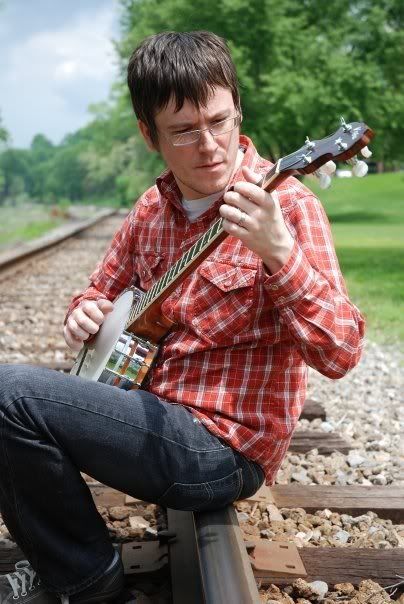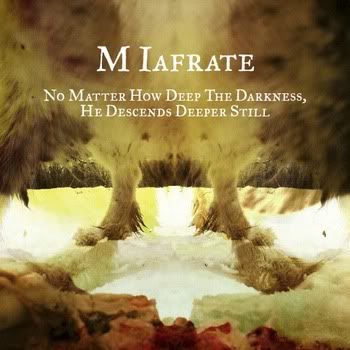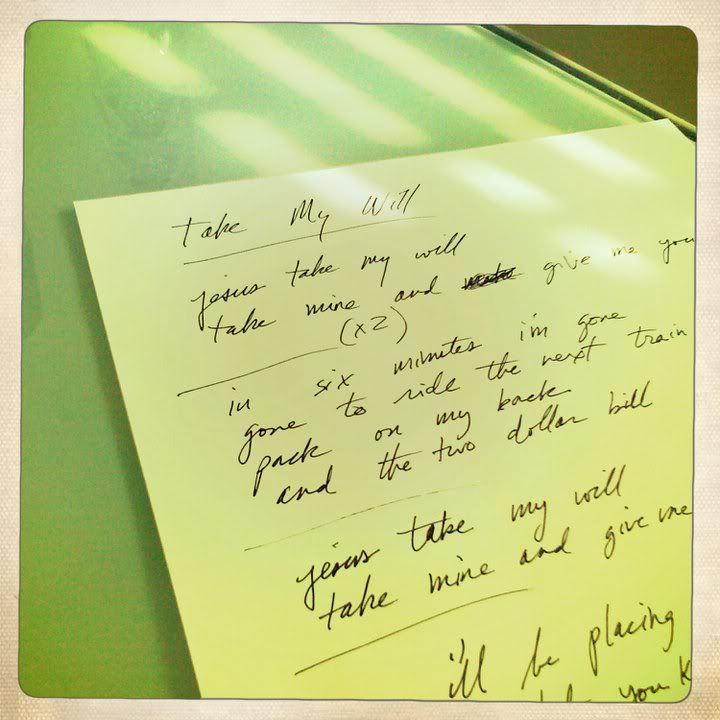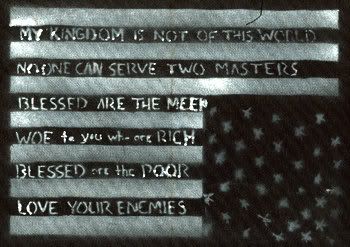Michael J. Iafrate spends his time wrestling with the big questions, so it’s only fitting that he kicked out a new five-song EP in less than a day. With influences ranging from Noam Chomsky to Catholic Anarchy to social, environmental and economic justice, we caught up with the “theo-folk” rocker to ask some questions about “The Priesthood,” Christian Burial, and how punk rock and Christianity might co-exist.
WVRockscene: Were you ever able to snag R.E.M.’s “Tour Film” on DVD?
Michael J. Iafrate: Haha, no. I have the thing on VHS here somewhere. I remember seeing it on DVD in stores years ago, but haven’t tracked down a copy yet. Its a great film. The footage of “These Days” and “I Believe” is so good.
rockscene: So how did the recording go? Must’ve been productive for you to kick out an EP in your spare time, less than 24 hours?
Iafrate: We recorded the thing in about four hours and Dave mixed and mastered it that evening. It was up by 3 a.m. the next morning. We started recording sessions for the upcoming M Iafrate & The Priesthood record (Christian Burial) last week and I mentioned to Dave then that I had an idea for an acoustic EP that we could record quickly while we were working on the full length. After we finished drums tracks the other day, I recorded these five songs live. The only overdubs are the harmonica and piano tracks. The Christian Burial record has been a long time coming so I thought it would be nice to get a short recording out to tide people over. Two of the tracks on the EP will appear as full band versions on Christian Burial. Dallas Campbell, who plays bass in the Priesthood, contributed the “deer guts” photography for the record.
rockscene: How smoothly has it gone recording with Dave Klug? Get to have any fun or has it been just straight business? What is Lagunitas Maximus and would you recommend it?
Iafrate: Dave and I have been friends for years and we have been playing music and recording together for a long time. He’s obviously super professional in what he does, but we’re friends so of course we have fun.
The Laguntas Maximus you refer to is but one example of that. It’s one of the really good beers we were enjoying while recording. Other “fun” included Dave introducing me to some great Pittsburgh restaurants, the movie The Road, and that show Tosh-something-or-other. I tried to get him to stay up and watch Anti-Christ with me but he bailed after twenty minutes. I don’t actually blame him.
rockscene: No Matter How Deep the Darkness, He Descends Deeper Still is named after (apparently) a book by Anthony Coniaris, about Jesus going into Hell, have you read that and why did you call the EP by the same name?
Iafrate: I have not read the book, no, but you are right that that is where the title comes from. I’m working on a doctorate in theology through a school in Toronto and while I was living there I worked at a theological book store. At one point we were selling Coniaris’ book and the title just grabbed me. I jotted it down and have had it in mind as an album or EP title ever since. And the title sort of suggested what kinds of songs might be on such a record. At one point I thought I might call the upcoming full length by that name, but decided against it and saved it for later.
“Later” is actually now, though, to my surprise. And right now that title called for these five songs to kind of flesh out various aspects of what that title means. I like the title of the record a lot, but I have mixed feelings about its meaning. The notion that Jesus shares in human suffering, and that humans share in Jesus’ suffering, is a long-held idea in Christianity. But the title kind of comes off like “Hey, you think you’re suffering? Jesus had it worse!” And I don’t think that’s necessarily historically true, nor does it necessarily generate the kind of solidarity-in-suffering that Christianity should generate. Maybe it does, I don’t know. Anyway, they are good, interesting words and they provoke thought and evoke some true feelings.
rockscene: These covers you do on the EP, they must be longtime favorites of yours, right?
Iafrate: They’re not necessarily “favorites” but they are songs I liked enough to want to cover and that I thought should come out of me at this point in time. The Priesthood used to cover “I Am The Bread Of Life” as a full band when we first started playing with this lineup.
“Take My Will” is a Jandek song that struck me a long time ago. I like the disconnect between the verses and the chorus. And it is one of those Jandek songs that actually has a discernable melody that I could stick a real chord progression behind and turn it into a more “traditional” song. Fans of Jandek know what I’m talking about. The Jayhawks song is just a really gorgeous and true song I really like right now.
rockscene: It’s so great to see someone whose faith not only motivates their music but also their actions in the world and being a force for justice and populist and/or progressive causes, from economic to environmental. Contrasting this with the more fascistic, reactionary types, to what extent does your faith and devotion to real social justice influence you, musically, personally and of course spiritually? How might you be able to have punk and spiritual ethos coexist?
Iafrate: These are tough questions and I’m not confident I’ve worked out answers to them for myself. I’ve always been a “religious” person but what that has meant for me has undergone pretty radical changes over the years. I’ve become increasingly critical of the religious cultures that I have grown up in and continue to be connected to. At the same time, the “spiritual” dimension of life is central enough for me that I’ve made a vocational investment to the academic study of theology. One reason why religious themes and images make their way into my music is simply the old saying “Write what you know.” I spend so much time reading and thinking and writing about the stuff, it’s just bound to come out in my songs.
But in addition to that, I think all people are “religious” in the sense that we all tend to wrestle to some degree with questions of ultimate value and of the passions that motivate how we live in this world. So my “faith,” or whatever you want to call that intentional wrestling, hopefully influences everything in my life, including my music. At the same time, I would emphatically deny that what I do is “Christian” or “religious” or “spiritual” music. The issues are more complicated than that kind of categorization will allow.
As far as the relationship between punk and spirituality goes, I’ve never personally felt the need to force the values or impulses of the two to get along or coexist. Punk in its various forms has always engaged spirituality, whether positively or negatively. Even when they’ve expressed a rejection of religion, I have always liked to think that most punks actually care about spirituality to such a degree that they feel the need to reject many dominant, middle and upper-class, and indeed fascistic forms of religion. For me, the radical impulse of early Christianity and the radical impulse of punk rock have some interesting similarities. I’m actually exploring some of these connections now in my academic work as well, especially through a group of theologian-musicians called the Rock and Theology project.
rockscene: Back to the music; when can we expect Christian Burial to be out?
Iafrate: We’re going to keep working hard on it through the spring and along the way we’ll come up with an interesting way to release it. We have some buddies playing here and there as guest musicians on it, so late summer might be pushing it. The fall would probably be a better prediction.
Related: Magic Town helps MAYSP this 9/11 (Iafrate Q&A)





No comments:
Post a Comment